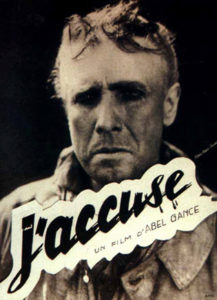 This silent epic can accurately be termed the screen’s first zombie mash. It’s French maestro Abel Gance’s 1919 pacifist screed, which until recently was known in its full version as a lost film. But J’ACCUSE! is now restored, so we can at last view it for what it is: a flawed yet undeniably impressive product of the early days of cinema.
This silent epic can accurately be termed the screen’s first zombie mash. It’s French maestro Abel Gance’s 1919 pacifist screed, which until recently was known in its full version as a lost film. But J’ACCUSE! is now restored, so we can at last view it for what it is: a flawed yet undeniably impressive product of the early days of cinema.
Abel Gance, a war veteran, conceived J’ACCUSE! around the idea that “if all the dead (of WWI) came back…the war would stop at once.” He visualized just that, predating the seminal zombie fests CARNIVAL OF SOULS and NIGHT OF THE LIVING DEAD by several decades. However, J’ACCUSE’S walking dead sequence doesn’t occur until near the end, with much of the rest of this near 3-hour film taken up with a silly love triangle (a dicey prospect, as PEARL HARBOR proved). Gance remade the film in 1937 with an entirely different storyline and an even more monumental walking dead sequence.
The 1919 J’ACCUSE! was a sizeable hit, and reportedly caused fainting in movie theaters. It was also one of Gance’s most technically innovative films, paving the way for his masterpiece NAPOLEON in 1927.
Until 2006, when France’s Lobster Films completed its reconstruction of the film, J’ACCUSE! was known in a poorly preserved version lasting under 40 minutes. The running time on the restoration, now available on DVD through Flicker Alley, is 166 minutes, which is said to be reflective of the film’s original length.
It features Edith, who’s married to the abusive soldier Laurin but is having an affair with the young poet Jean. Laurin hates Jean, especially when Laurin has to leave for war while Jean gets to wait another few weeks before he ships out. In the trenches, however, Jean wins Laurin’s trust by taking his place on a dangerous mission behind enemy lines.
When they return home on leave, Laurin and Jean learn Edith has a child. Laurin is convinced the child is Jean’s and becomes determined to kill it, leaving Edith with no recourse but to reveal the ugly truth: she was raped and impregnated by German soldiers while Laurin and Jean were fighting. They become determined to avenge her death, but back on the front lines Laurin is killed and Jean driven insane.
Back home once again, Jean gathers together everyone in the immediate vicinity and tells them of a terrifying occurrence he witnessed on the front: hundreds of dead soldiers rose from their graves! The zombies’ purpose is to ask those still living if they’ve made their wartime sacrifices worthwhile—if that question is answered satisfactorily then the dead soldiers will go back to their graves. Jean’s audience naturally thinks his tales of the walking dead are figments of his psychotic imagination, but subsequent events convince them otherwise…
Abel Gance was always an innovator, and the fast cutting and expressionistic visuals of J’ACCUSE were unprecedented for their time. It remains an eye-popping film, with artful compositions and gorgeous color tinted photography.
Gance, however, was still far from perfecting his craft. The histrionic performances, melodramatic storyline and overlong running time confirm this, as do the disappointing battle scenes. The war sequences are curiously subdued, essentially a series of quick montages; perhaps sensing they weren’t all they could be, Gance superimposed images of dancing skeletons to help convey the horror he was so desperately trying to impart.
But of course our interest isn’t in the war scenes, but rather the climactic zombie attack. The lighting in this sequence is dark and shadowy, and the masses of what look like hundreds of walking corpses, many bearing evident war wounds, create an effect of overwhelming horror that nearly makes up for the inertness of so much of the rest of the picture.
Vital Statistics
J’ACCUSE! (I ACCUSE!) Pathe Freres
Director: Abel Gance
Producer: Charles Pathe
Screenplay: Abel Gance
Cinematography: Marc Bujard, Leonce-Henri Burel, Maurice Forster
Editing: Andree Danis, Abel Gance
Cast: Romuald Joube, Severin-Mars, Maryse Dauvray, Maxime Desjardins, Angele Guys, Mancini, Elizabeth Nizan, Pierre Danis
